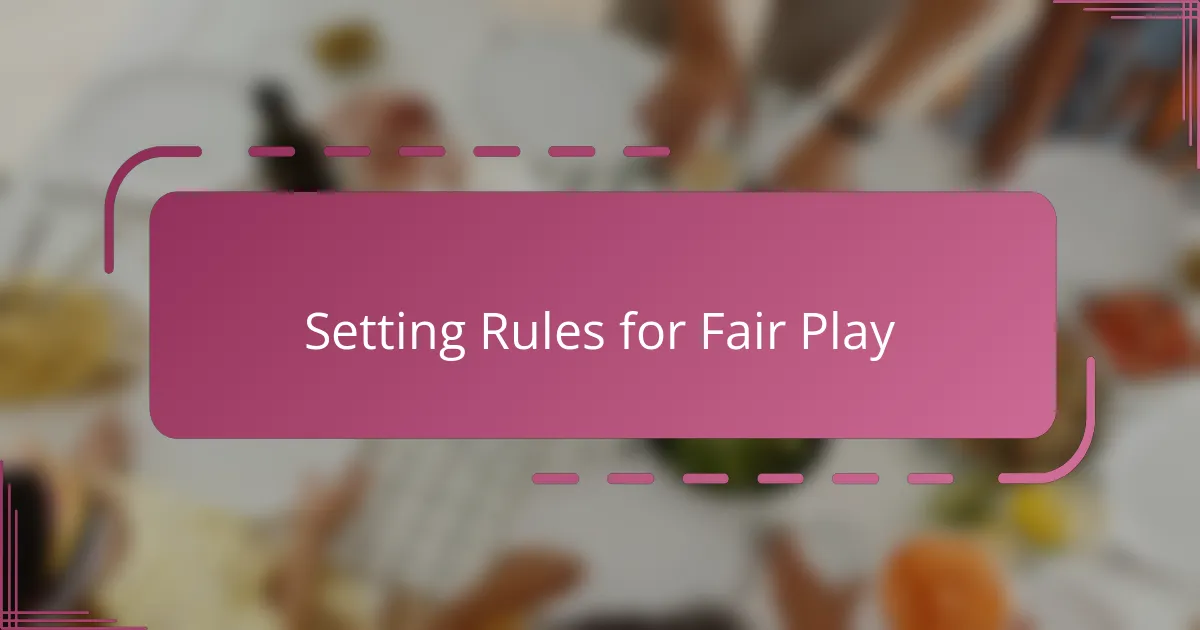Key takeaways
- Family game nights foster connection, boost confidence, and create lasting memories through shared laughter and friendly competition.
- Choosing games that encourage teamwork and engagement, like Scrabble, ensures everyone participates and enjoys the experience.
- Introducing games with simple rules and relatable content helps children learn and develop a love for learning in a fun environment.
- Setting clear rules collaboratively promotes fairness and respect, making the game more enjoyable and focusing on fun rather than disputes.

Understanding Family Game Night Benefits
Family game nights aren’t just about passing the time—they bring families closer in a way that daily routines often don’t allow. I’ve noticed that when we play together, there’s a unique sense of connection that grows, almost like the laughter and friendly competition weave a stronger bond. Have you ever experienced that moment when a simple game sparks genuine joy and conversation among everyone?
From my experience, these evenings also boost kids’ confidence and critical thinking. Watching my children carefully choose their Scrabble words, I could see how the game gently challenged their minds while making learning feel natural and fun. It’s amazing how a playful challenge can turn into meaningful growth right before your eyes.
Moreover, family game nights create memories that linger far beyond the game board. I often find myself reflecting on those shared smiles and lighthearted moments, realizing that these experiences build the emotional foundation for a supportive family culture. Isn’t that the kind of environment we all want for our children?

Choosing Games for Family Engagement
Choosing the right game for family engagement can be surprisingly tricky. I’ve learned that games like Scrabble work well because they invite everyone to participate at their own pace, sparking both fun and meaningful interaction. Have you noticed how a game that balances challenge with accessibility keeps everyone involved rather than frustrated or bored?
When picking a game, I consider the interests and ages of my kids. Sometimes, it’s tempting to go for something quick and flashy, but I’ve seen that games encouraging teamwork and conversation, like Scrabble, make the night more memorable. It’s those moments when we all cheer or patiently wait for a turn that truly bring us closer together.
Also, I’ve found that including a game with simple rules but deep strategic elements helps sustain engagement over time. Do you want a game that just fills the evening or one that continues to stimulate minds and laughter long afterward? For me, the latter is always worth the extra thought during game selection.

Introducing Scrabble to Children
Introducing Scrabble to children can feel a bit daunting at first, but I’ve found that starting with the basics keeps things fun and pressure-free. When I introduced the game to my kids, I focused on celebrating every word they could come up with, no matter how small. Have you ever noticed how a little encouragement turns nervousness into excitement?
I also like to break the game into smaller steps—like playing with just a handful of tiles and gradually adding more complexity as their confidence grows. Watching my youngest proudly place his first three-letter word was a moment I’ll never forget; it really solidified his enthusiasm. Isn’t it amazing how these small victories can spark a lifelong love of learning?
Another trick I’ve used is relating the words to things my children know and love, which helps them connect the dots between Scrabble and their everyday world. For instance, when my daughter played “cat,” it turned into a story about our pet, making the game feel personal and meaningful. Wouldn’t you agree that learning feels best when it’s tied to what matters most to us?

Setting Rules for Fair Play
Setting clear rules before the game starts has always made our Scrabble nights smoother and more enjoyable. I remember one evening when someone tried to challenge a word that neither of us was sure about, and having a dictionary handy helped settle the score without any hard feelings. Don’t you find that having agreed-upon rules keeps the focus on fun rather than arguments?
I also like to involve my kids when setting the rules, asking questions like “What’s fair for everyone?” This not only makes them feel heard but also teaches them about fairness and respect in a playful environment. Have you noticed how kids tend to follow rules better when they’ve helped create them?
Sometimes, we add house rules to keep the game lighthearted, like allowing creative word combinations or bonus points for funny words. These little tweaks have turned tense moments into bursts of laughter, reminding me that fair play doesn’t mean being rigid—it’s about keeping the game friendly and inclusive. Would you agree that flexibility in rules often leads to the best memories?

Encouraging Learning Through Scrabble
Scrabble has been a fantastic way to encourage learning without it feeling like a lesson. I’ve seen how my kids get excited to discover new words, sometimes surprising me with vocabulary they picked up from books or shows. Isn’t it rewarding when a game naturally sparks curiosity rather than forcing it?
One thing I appreciate about Scrabble is how it subtly builds spelling and math skills—counting points, weighing letter values, and planning moves ahead. Watching my children strategize and calculate scores reminded me how enjoyable learning can be when it’s part of something playful. Have you noticed how games sometimes teach important skills better than formal study?
I’ve also found that Scrabble fosters a positive attitude toward mistakes. When someone tries a tricky word that doesn’t work, we celebrate the effort and explore why it wasn’t valid. This approach has helped my kids become more resilient learners, understanding that errors are just stepping stones. Isn’t that the kind of mindset every parent hopes to nurture?

Personal Experience with Family Scrabble
One memorable night, my youngest surprised me by forming the word “sun” all by himself. That simple moment, his eyes lighting up with pride, made me realize how powerful Scrabble can be in boosting a child’s confidence. Have you ever witnessed a tiny victory turn into pure joy?
I’ve also found that watching the family brainstorm together over tricky letters brings a special kind of warmth to the room. It’s not just about winning; it’s about sharing ideas, laughter, and even playful debates over word meanings. Doesn’t that collaborative spirit remind you why family game nights are so precious?
Sometimes, the competitive edge sharpens unexpectedly, but I quickly remind everyone that the real win is the time we spend connecting. After all, those moments when we all pause, smile, and encourage each other are what I cherish most. Have you noticed how a friendly game night can turn into lasting memories?


